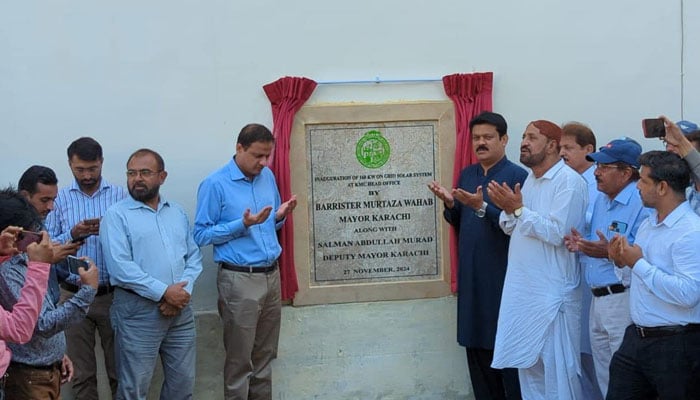Mayor inaugurates solar system conversion of KMC building
Karachi Mayor Barrister Murtaza Wahab on Wednesday announced that the Karachi Metropolitan Corporation (KMC) has become Pakistan’s first municipal council to transition to solar energy. He said that following the installation of a solar system at the KMC building, the KMC’s financial burden would be reduced by millions of rupees.
Wahab said the surplus electricity generated by the solar system would be sold to K-Electric. With the Sindh government’s support, four hospitals are also being transitioned to solar power, with work expected to be completed by January, while three major highways in the city will also be converted to solar energy, he added.
He emphasised that the KMC and the Karachi Water & Sewerage Corporation have worked to promote the city’s positive aspects globally. He highlighted that every representative of the Pakistan Peoples Party (PPP) actively serves the city, and made the assurance that more development work is planned for the coming days.
He inaugurated the solar system conversion of the KMC building that was attended by Municipal Commissioner SM Afzal Zaidi, the PPP’s parliamentary party leader in the City Council Karamullah Waqasi, Jumman Darwan and other council members.
The mayor said the KMC building is now powered by a 150kW solar system, of which 80kW has been integrated into KE’s net metering system. He said further steps would be taken to improve the KMC’s revenue, noting that PPP workers’ dedication to the city and its residents is evident in ongoing improvements.
He claimed that the city has moved beyond the era of crimes like China-cutting and body bags, and is now witnessing vibrant and healthy activities. He also mentioned the successful installation of solar panels at the Kidney Hill Park, with plans to transition more parks, recreational spaces and roads to solar power.
He said that a total of 259 solar panels have been installed on the roof of the KMC building, producing approximately 650 to 700 units of electricity daily. He noted that major cities worldwide are adopting alternative energy sources, such as solar panels and wind energy, and that the country’s climate makes solar energy particularly easy to harness.
Wahab said efforts to expand the use of solar panels at provincial level are also commendable. He said projects under the District Annual Development Programme are under way in various city areas, including Baldia Town and Keamari. Pedestrian bridges, once considered outdated, have been outsourced to ensure their safety and maintenance, he added.
-
 Katie Price Seen With New Hubby Lee Andrews Weeks After Tying The Knot
Katie Price Seen With New Hubby Lee Andrews Weeks After Tying The Knot -
 Biggest Order Yet Issued Against Andrew Mountbatten-Windsor: King Charles You Have To’
Biggest Order Yet Issued Against Andrew Mountbatten-Windsor: King Charles You Have To’ -
 ByteDance’s Seedance 2.0 Marks New Era Of Cinematic AI-generated Videos: Here’s How
ByteDance’s Seedance 2.0 Marks New Era Of Cinematic AI-generated Videos: Here’s How -
 Struggling With Obesity? Here's How To Manage It
Struggling With Obesity? Here's How To Manage It -
 How Epstein Scandals Are Impacting King Charles’ Healing As Stress Refuses To Relent: ‘Could Spell His End’
How Epstein Scandals Are Impacting King Charles’ Healing As Stress Refuses To Relent: ‘Could Spell His End’ -
 Ciara, Russell Wilson Become Matchmakers For Pals?
Ciara, Russell Wilson Become Matchmakers For Pals? -
 Why Prince William Releases Statement On Epstein Scandal Amid Most 'challenging' Diplomatic Trip?
Why Prince William Releases Statement On Epstein Scandal Amid Most 'challenging' Diplomatic Trip? -
 Historic Mental Health Facility Closes Its Doors
Historic Mental Health Facility Closes Its Doors -
 Top 5 Easy Hair Fall Remedies For The Winter
Top 5 Easy Hair Fall Remedies For The Winter -
 Japan Elections: Stock Surges Record High As PM Sanae Takaichi Secures Historic Victory
Japan Elections: Stock Surges Record High As PM Sanae Takaichi Secures Historic Victory -
 Prince William, Kate Middleton Finally Address Epstein Scandal For First Time: 'Deeply Concerned'
Prince William, Kate Middleton Finally Address Epstein Scandal For First Time: 'Deeply Concerned' -
 Kim Kardashian Promised THIS To Lewis Hamilton At The 2026 Super Bowl?
Kim Kardashian Promised THIS To Lewis Hamilton At The 2026 Super Bowl? -
 Andrew Mountbatten-Windsor Throws King Charles A Diplomatic Crisis
Andrew Mountbatten-Windsor Throws King Charles A Diplomatic Crisis -
 Barack Obama Hails Seahawks Super Bowl Win, Calls Defense ‘special’
Barack Obama Hails Seahawks Super Bowl Win, Calls Defense ‘special’ -
 Pregnant Women With Depression Likely To Have Kids With Autism
Pregnant Women With Depression Likely To Have Kids With Autism -
 $44B Sent By Mistake: South Korea Demands Tougher Crypto Regulations
$44B Sent By Mistake: South Korea Demands Tougher Crypto Regulations




